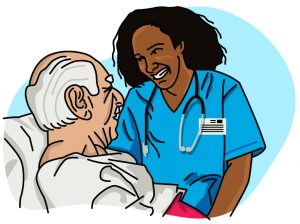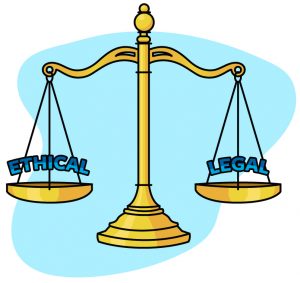For those looking to find a career that involves helping, healing, and nurturing those around them, nursing is a great path to success. Becoming a nurse is one of the most rewarding, fulfilling career paths students can pursue, with each professional hour dedicated to helping those around you. A competent nursing school instills in its students core values that will carry them into their future careers. If you’re thinking about pursuing a nursing degree, here are some of the core values of nursing that we think are fundamental to your nursing education.
Empathy and Caring
A nursing school should teach its students the true value of empathy and compassionate care. At Goodwin University, we believe empathy is a nurse’s ability to understand, be aware of, be sensitive to, and vicariously experience the feelings, thoughts, and experiences of the patient and their family. The faculty believes that it is the nurse’s ability and willingness to “tune in” to and focus on the patient’s experiences that is fundamental to the methods nurses use to manage care. Empathy is based upon respect for the dignity of the client and an appreciation for the independence and self-actualization of the patient.
As a foremost nursing school in CT, we believe caring involves knowing and trusting the patient, an interest in their growth and well-being, honesty, courage, and humility. A caring nurse knows that he or she does not know all there is to know about the patient, and projects the confidence and patience to help them maintain hope or the sense of continued possibility for growth and change. Caring involves the planning and provision of culturally sensitive and appropriate care.
Communication

We believe communication—the exchange of thoughts, messages, or information—is of vital importance to the nursing process. A nurse uses communication skills—speech, signals, writing, and behavior—during patient assessment, as well as the planning, implementing, and evaluating of nursing care. A nurse communicates with patients, families, groups, and members of the health care team. They are competent in oral and written forms of communication, as well as in techniques of therapeutic communication.
Teaching
We believe one of the most important roles of a nurse is to assist patients and their families with receiving information necessary for maintaining a patient’s optimal health. A nurse provides patients and families with information that is based on their assessed learning needs, their abilities, their learning preference, and their readiness to learn. Fundamental to the provision of patient education is a nurse’s belief that patients have the right to make informed decisions about their care. Nurses provide information that is accurate, complete, and relevant to client needs. A nurse often clarifies information provided by other members of the health care team.
Critical Thinking

Nurses are constantly involved with making accurate and appropriate clinical decisions. We believe nurses must be able to think critically and make decisions when patients present problems for which there may not be clear, textbook solutions. A nurse must question, wonder, and be able to explore various perspectives and possibilities in order to best help patients. Critical thinking involves an active, organized cognitive process designed to allow a nurse to explore and challenge assumptions. Nurses that engage in critical thinking reflect on past experiences, think independently, take risks based on knowledge, persevere in the face of difficult problems, are curious, creative, and ethical.
Psychomotor Skills
We believe that fundamental to nursing is the “laying on of hands” to provide comfort, and the use of specific skills to accomplish client assessment and to provide and evaluate nursing care. Nursing skills are utilized in a manner that maximizes client comfort and dignity, optimizes the client’s ability to respond positively, provides the highest level of accuracy of information, and provides for the most favorable patient outcomes. Psychomotor skills are best learned through practice after achieving an understanding of the basic principles of skills as part of a nurse’s education at an exceptional nursing school like Goodwin University.
Applied Therapeutics
A nurse applies medically-ordered therapeutic modalities, like pharmacological and nutritional interventions, etc. A nurse’s application of these modalities is based on a knowledge base regarding their therapeutic uses, as well as skills in patient assessment and evaluation. The competent application of nutritional knowledge also involves its use in health and wellness, as well as when therapeutic diets are prescribed.
Ethical and Legal Considerations

A nurse plans, provides, and evaluates nursing care guided by specific ethical and legal boundaries. We believe the Code of Ethics for Nurses provides the ideal framework for safe and correct practices and behavior. Ethical behavior also involves accountability, responsibility, confidentiality, truthfulness, fidelity, and justice. Nurses who clarify their values are enhanced in their ability to practice ethically.
Legal parameters of nursing are defined by statutory, regulatory, and common law. In addition, professional standards of care provide the legal guidelines for nursing practice. Legal considerations in the care of clients involve issues like negligence, malpractice, abandonment, assault, battery, and informed consent. Nurses must understand legal boundaries to protect their patients’ and their own rights.
Professionalism
Professionalism involves the characteristics of a nurse that reflects his or her professional status. These characteristics involve behaviors with regard to self, patients, others, and the public as they reflect the values of the nursing profession. Professional personas are knowledgeable in their subject matter, conscientious in their actions, and responsible for themselves and others. Written standards for practice and professional performance guide the behaviors of professional practitioners. We believe nurses enhance their professionalism by understanding history, educational choice, professional research and theory, and their professional organizations and standards.
Check out our video here.
Interested in learning more about Goodwin University? Learn more today, or check out all of our nursing programs to see why we’re a leader in healthcare education in CT! You can also see our video for three unexpected skills you gain as a nurse.
Goodwin University is a nonprofit institution of higher education and is accredited by the New England Commission of Higher Education (NECHE), formerly known as the New England Association of Schools and Colleges (NEASC). Goodwin University was founded in 1999, with the goal of serving a diverse student population with career-focused degree programs that lead to strong employment outcomes.

